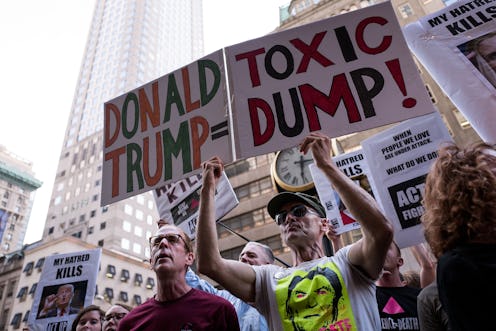News
What Happens When Delegates Skip The Convention?
A whole bunch of GOP lawmakers, party bigwigs, and delegates have to wash their hair the weekend of the Republican National Convention. Donald Trump's status as their party's presumptive presidential nominee is leading to low turnout at the July event, where his nomination will likely become official, and some of the delegates expected to cast their votes won't be present. What happens when delegates skip the convention?
Sen. John McCain and Sen. Kelly Ayotte are among the party members opting out of the convention. Both of them are fighting tough battles for reelection in their states. A number of senators, representatives, and governors have expressed hesitance, but not outright refusal, to attend, including Gov. John Kasich, Gov. Nikki Haley, and Sen. Rand Paul, who is a delegate. According to The New York Times, several Republican lawmakers are concerned that their involvement in the convention would associate them too closely with the Trump, which may cause them to fall out of favor with their constituents and lose their elections in November.
And then there are those, like former Indiana Delegate Josh Claybourn, who flat-out say that they just can't cast a vote for Trump. Claybourn blogged the following, announcing his resignation as a delegate:
Although I applied to be a delegate with the seemingly small chance that [Trump] could be the nominee, at the time I applied I did not believe he would have the nomination locked up in a such a way as to make the convention a celebration of his candidacy. I want no part of that.
Most delegates who opt out will be replaced by the alternate delegates who were selected in their states. And these alternates will be bound to vote based on the primary results in their states, just as the original delegates were bound. The only delegates without alternates are the 168 members of the Republican National Committee (RNC).
If an RNC member or an alternate doesn't attend the convention, it doesn't really matter, since party rules, as they currently stand, dictate that votes will be counted in accordance with primary results, even if a delegate tries to go rogue by voting differently. Presumably, this holds for when a delegate just doesn't show up and cast a vote as well.
Delegates' votes on the first ballot are more symbolic than anything. Current party rules stipulate:
The Secretary of the Convention shall faithfully announce and record each delegate’s vote in accordance with the delegate’s obligation under these rules, state law or state party rule. If any delegate bound by these rules, state party rule or state law to vote for a presidential candidate at the national convention demonstrates support under Rule 40 for any person other than the candidate to whom he or she is bound, such support shall not be recognized.
The Rules Committee could change this, and there's been chatter of unbinding the delegates through rule changes. This drastic overhaul would require majorities from both the committee and the convention delegates to pass, and that level of support is unlikely. It's unclear what such a change would mean for absent delegates' votes.
Whether they show up and cast that first ballot or not, delegates' votes will in all likelihood go to Trump in accordance with primary results, meaning he will have the majority needed to officially be proclaimed the nominee.
